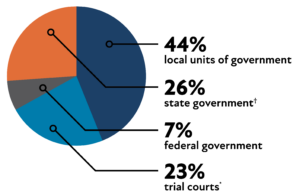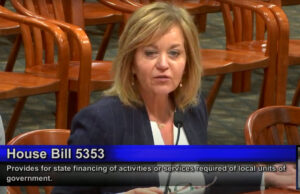House committee hears testimony as trial court funding deadline looms

Trial court funding sources (April 2023).
Legislative efforts ramped up this week to address funding for Michigan’s trial courts, which are now facing the legal expiration of a key funding source.
Action is now in the House Judiciary Committee and focused on two bills: House Bill 5392, by Rep. Sarah Lightner (R-Jackson), extends the current May 1, 2024, sunset date on the authority of courts to levy fees to May 1, 2026; and House Bill 5534, by Rep. Kelly Breen (D-Oakland), which outlines a plan for the State Court Administrative Office to collect data on trial court costs and revenue sources and provide a report to the Legislature with proposals to implement the Trial Court Funding Commission’s recommendations from 2019.
MAC is supporting both efforts, though its immediate focus is on HB 5392, since inaction would create an immediate funding gap. MAC testified to this point on Wednesday.
Courts stand to lose nearly $50 million in operational funding annually if HB 5392 does not pass. This loss of revenue, if not supplemented by the state, will fall on the counties to cover.
It is expected that HB 5392 will advance out of committee in an amended form to set a Dec. 31, 2026, sunset on fee authority.
Political dynamics in the House, however, could delay passage of both bills. The bills are expected to be tie-barred, meaning one cannot move through the legislative process without the other.
The bills are likely to be voted out by the committee next week and move to the House floor.
For more information on this issue, contact Samantha Gibson at gibson@micounties.org.
MAC urges passage of bill to deter unfunded mandates on locals

Deena Bosworth testifies on HB 5353 before the House Local Government Committee.
A renewed effort to require legislators to consider the fiscal implications of new mandates on local governments prior to enacting them received MAC’s support in testimony before the House Local Government Committee this week.
House Bill 5353, by Rep. John Fitzgerald (D-Kent), is a re-introduction of legislation that’s been introduced every legislative session since the Legislative Commission on Unfunded Mandates issued its report in 2009. In the last Legislature, Sen. Ed McBroom (R-Dickinson) was able to move SB 449 out of committee before it stalled on the Senate floor.
HB 5353, as with previous iterations, seeks a fiscal note process for legislation and departmental rules that increase or create new mandates on local units of government. It requires the identification of additional mandated services and a cost estimate for those services prior to the third reading of the bills in the originating legislative chamber or prior to the implementation of new departmental rules. This approach will allow legislators to have prior knowledge of the potential costs and be able to weigh their support or opposition based on complete information.
Funds required to perform the new mandates must be appropriated and sent out to local units before the locals would have to comply with the new mandates. The bill would affect new bills and rules only.
Twenty-eight states have similar reporting requirements, and many states have requirements that mandates must be funded. Michigan’s “Headlee Amendment” already requires that our mandates be funded. However, this requirement has not been routinely met.
With county-controlled resources (property taxes) already constrained by Headlee and Proposal A, additional service requirements imposed on counties by the state must come with the resources to meet them, MAC’s Deena Bosworth told committee members this week during her testimony (see 39:00 mark).
No vote was taken on the bill this week, but MAC is hopeful the bill will advance this spring.
For more information on this issue, contact Deena Bosworth at bosworth@micounties.org.
Senate appropriations panel hears from MAC on juvenile justice reforms
 Severe shortages in staffing and bed space are limiting the effects of juvenile justice reforms enacted last year, MAC told a Senate appropriations subcommittee this week.
Severe shortages in staffing and bed space are limiting the effects of juvenile justice reforms enacted last year, MAC told a Senate appropriations subcommittee this week.
Panel Chair Sen. Sylvia Santana (D-Wayne) convened a hearing to gauge the state of juvenile justice reform at the state and county level and determine the needs of counties and courts providing juvenile justice services.
MAC’s Samantha Gibson was among stakeholders who spoke to the struggles faced at the county level in providing care and support to youth in the justice system.
Among the reforms from enacted last year and now being implemented, the Child Care Fund reimbursement rate increase from 50 percent to 75 percent is most beneficial, Gibson told the panel, allowing courts and counties to expand on previously provided programs or possibly create new ones they could not fund prior to the increased reimbursement rate.
MAC once again called on legislators and the Department of Health and Human Services to assist in addressing the staffing shortage in juvenile detention facilities. More funding to counties is needed to boost staff wages and, in turn, promote more effective recruitment and retention efforts.
Additional hearings on this topic are expected in coming weeks.
For more information on this issue, contact Samantha Gibson at gibson@micounties.org.
State gets federal grant for juvenile services
 Treatment options in counties for justice-involved or high-risk youth will be expanded by the Michigan Department of Health and Human Services (MDHHS) with a $825,000 grant from the federal government.
Treatment options in counties for justice-involved or high-risk youth will be expanded by the Michigan Department of Health and Human Services (MDHHS) with a $825,000 grant from the federal government.
The department intends to use these federal dollars to create more beds and more appropriate placement options for high-risk youth in need of long-term residential treatment. According to MDHHS, Project activities include:
- Starting a Juvenile Justice Planning Council that will advance efforts to reduce the number of youth placed in detention or secure residential placements through effective prevention, intervention, diversion and re-entry services.
- Identifying evidence-based practices, and culturally appropriate strategies that advance the long-term well-being and success of youth and their families.
- Developing strategies to evaluate the economic impact of changes that result in cost savings and identifying how those cost savings can be reinvested into the larger continuum of care.
- Creating a sustainable framework that supports reducing incarceration of youth and their diversion into community programs through a coordinated, collaborative strategy that also promotes safe communities.
For more information on this issue, contact Samantha Gibson at gibson@micounties.org.
House committee backs bill to address sheriff staffing
 Legislation to allow county boards of commissioners to choose if retired county employees who work at a sheriff’s office can continue to receive retirement benefits during a period of re-employment advanced out of committee this week.
Legislation to allow county boards of commissioners to choose if retired county employees who work at a sheriff’s office can continue to receive retirement benefits during a period of re-employment advanced out of committee this week.
House Bill 5203, by Rep. Kelly Breen (D-Oakland), received unanimous support from the House Local Government Committee and now moves to the House floor.
At present, if a person receiving retirement benefits becomes re-employed by the same county, their retirement payments are suspended for the length of their re-employment. The bill would allow retirement benefits to continue during re-employment if a retiree is hired by a sheriff’s office.
Allowing this practice would help address the severe staffing shortages seen within county sheriff’s offices.
MAC supports this legislation.
For more information on this issue, contact Samantha Gibson at gibson@micounties.org.
Podcast team discusses MAC’s behind-the-scenes efforts at Capitol
 While the State Capitol might not be dominating headlines with passage of major legislation so far in 2024, the work there for MAC is as expansive as ever, members of the Podcast 83 Team note in their newest episode.
While the State Capitol might not be dominating headlines with passage of major legislation so far in 2024, the work there for MAC is as expansive as ever, members of the Podcast 83 Team note in their newest episode.
The legislative slowdown continues from the results of last November’s elections when the Democrats lost their majority in the House, leaving a 54-54 chamber that will remain tied until the end of April when new members are seated for two vacancies.
MAC, however, continues to crisscross the Capitol campus to brief legislators on county priorities and needs.
MAC, for example, testified last week before a Senate appropriations panel on the association’s opioid settlement efforts and the reaction was widely positive, Samantha Gibson reported.
“Our feeling on feedback from senators after that committee hearing was that they were really glad and impressed to hear about what was going on at MAC,” Gibson said. “It is important to note that I don’t believe anyone has started spending their settlement dollars yet and that’s because counties are really taking the time to hear from stakeholders and make sure that as many people as possible are engaged in the process, that they’re going to spend those dollars as effectively as they can.”
Director of Governmental Affairs Deena Bosworth spoke about her planned testimony on House Bill 5353 (see item above).
“MAC has always been supportive of any kind of unfunded mandates legislation dating back to 2009, when the legislative commission on unfunded mandates issued their report,” Bosworth explained. “We have not been successful in getting this all the way through the process and enacted. I’m keeping my fingers crossed that we can cross that threshold this time.
“The only teeth (in the bill) are that we don’t have to comply … if they don’t follow the fiscal note process,” Bosworth added. “
View the full video of the episode, recorded on March 4, by clicking here.
Previous episodes can be seen at MAC’s YouTube Channel.
And you always can find details about Podcast 83 on the MAC website.
Webinars explain how to challenge internet connection maps
![]() The Michigan High-Speed Internet Office (MIHI) will soon be testing the unserved, underserved and served status of homes, businesses and community anchor institutes across the state. Individuals will be able to complete the BEAD Challenge Process to determine the status of their internet connection, verifying the accuracy of the maps determined by the National Telecommunications and Information Administration (NTIA). The challenge process will be open March 25-April 23.
The Michigan High-Speed Internet Office (MIHI) will soon be testing the unserved, underserved and served status of homes, businesses and community anchor institutes across the state. Individuals will be able to complete the BEAD Challenge Process to determine the status of their internet connection, verifying the accuracy of the maps determined by the National Telecommunications and Information Administration (NTIA). The challenge process will be open March 25-April 23.
While individuals may complete the testing process, they cannot submit the data themselves. Only local units of government, tribal governments, internet service providers and nonprofit can submit this data to MIHI.
Many county buildings are considered community anchor institutes, so they are able to challenge their connection status through the process.
MAC will share reminders as the start of the challenge process nears. In the meantime, MIHI will be hosting two upcoming webinars for participants to learn more:
- Designed for Eligible Challengers – Tuesday, March 12, 1 p.m.-2m.
- Eligible Challengers are local units of government, tribal governments and nonprofits.This session will cover what types of challenges will be accepted, what type of evidence will be required, and how to use the State Challenge Portal to submit challenges and evidence.
- Designed for Community Anchor Institutions – Thursday, March 14, 1:30 p.m.-2:15m.
- CAIs are organizations that serve as hubs for digital access in their communities and, as a result, have increased connectivity. This session will cover how CAIs can verify whether they are correctly represented on the map and how they may monitor and respond to any challenge about whether they fit the definition of a CAI.
For more information on MAC’s work on broadband issues, contact Madeline Fata at fata@micounties.org.
EPA opens grant program on hazardous waste
 Funding opportunities for household hazardous waste collections and setting up waste diversion centers will soon be available to counties. The U.S. Environmental Protection Agency (EPA) has shared the following information with the Michigan Department of Environment, Great Lakes, and Energy:
Funding opportunities for household hazardous waste collections and setting up waste diversion centers will soon be available to counties. The U.S. Environmental Protection Agency (EPA) has shared the following information with the Michigan Department of Environment, Great Lakes, and Energy:
“U.S. EPA Region 5 has opened the FY2024-2025 Source Reduction Assistance Notice of Funding Opportunity. This regional competitive grant program provides funding for projects that promote practical source reduction practices, tools, and training or Pollution Prevention (P2) approaches, such as reducing single-use plastics or using green cleaning or other safer chemical alternatives.
“Tribes, States, local governments and not-for-profit organizations are eligible for funding. Region 5 anticipates awarding 1-4 projects ranging from $40,000-$240,000 up to a total of $240,000 in federal funds. The number of awards is subject to the availability of funds, the quality of applications received, and other applicable considerations. The application deadline is April 15, 2024.”
While a variety of projects are eligible, the program’s priority areas are:
- Prevention of Greenhouse Gas Emissions
- Hazardous Materials Source Reduction
- Innovative approaches to conservation of materials and resources
- Environmental Justice through P2 Actions
For additional support, contact Claudia Santiago at 312-886-0674 or Santiago.claudia@epa.gov.
NACo continues to accept Achievement Award applications
 Since 1970, the NACo Achievement Awards have recognized outstanding county government programs and services. Through a non-competitive application process, noteworthy programs receive awards in 18 categories that cover a vast range of county responsibilities.
Since 1970, the NACo Achievement Awards have recognized outstanding county government programs and services. Through a non-competitive application process, noteworthy programs receive awards in 18 categories that cover a vast range of county responsibilities.
Applications are due March 30, 2024.
Michigan counties have won numerous awards in recent years for efforts ranging from the use of recycled materials for roads to cyber defense strategies to specialty courts.
Click here for more information or to begin your application process.
 The Opioid Advisory Commission (OAC) is excited to share its 2024 Annual Report.
The Opioid Advisory Commission (OAC) is excited to share its 2024 Annual Report.
Please find the report, available here. It is also publicly accessible on the OAC’s website under “Commission Documents” > “Annual Reports.”
Also available is the 2024 supplemental brief. This document covers overarching themes, key takeaways/needs, and primary funding recommendations for appropriation from the Michigan Opioid Healing and Recovery Fund.
The OAC is also in the process of finalizing its “Action Guide”, anticipated for release later this month. The Action Guide will lay out steps that state leaders can take to support/adopt OAC recommendations.
For information about MAC’s work on opioid settlements, click the image or contact Amy Dolinky at dolinky@micounties.org.
 Staff picks
Staff picks
- Road Funding Options Presentation to MAC Transportation Committee (Public-Sector-Consultants)
- New CBO projection shows Highway Trust Fund status continues to worsen without congressional action (NACo News)
- Michigan should eliminate parking mandates (Citizens Research Council of Michigan)
- Can going modular fix our housing shortage? Not yet. (Governing)
